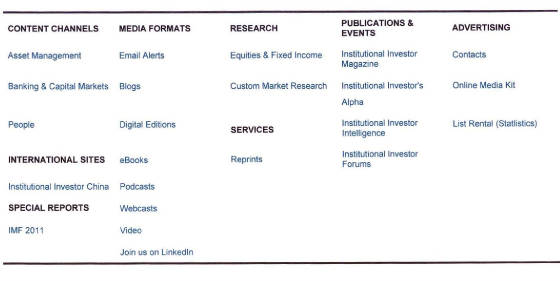|
This 'n That: Jeff's Blog
|
|
|
Wednesday, February 27, 2013
The real truth about market research?
Here it is, in this dismissal of the validity of market research, from
Denis Forman, British TV innovator who won an Emmy as executive producer of “The Jewel in the Crown”: “It doesn’t tell you what people are going to like. It tells you what they already like.”
Or perhaps not--market researchers may beg to differ.
Can't market
research be designed to accurately predict the future? What about election polls?
-- Jeff Bogart
11:15 am est
Tuesday, February 26, 2013
How Well Do Companies Understand Tomorrow's Consumer?
A recent i ssue of McKinsey Quarterly has an excellent article about ssue of McKinsey Quarterly has an excellent article about the rewards that "emerging-market cities" hold for companies willing to understand the needs of consumers in those
locales and how to market to them. (See "Unlocking the potential of emerging-market cities," Sept. 2012). It reminds me of another McKinsey Quarterly article
over a year ago that envisioned the possibility of a reduced role for equities in emerging markets because investors in emerging
markets currently favor other asset classes. "How the role of equities may shrink" (12/10/11). In reacting to the earlier article, I blogged as follows: the rewards that "emerging-market cities" hold for companies willing to understand the needs of consumers in those
locales and how to market to them. (See "Unlocking the potential of emerging-market cities," Sept. 2012). It reminds me of another McKinsey Quarterly article
over a year ago that envisioned the possibility of a reduced role for equities in emerging markets because investors in emerging
markets currently favor other asset classes. "How the role of equities may shrink" (12/10/11). In reacting to the earlier article, I blogged as follows: "Although
there would seem to be no single, monolithic 'emerging market household,' it will be interesting to see whether and how observers
come up with overarching similarities and then differentiate among various national economies and social groups when it comes
to spending and psychographic categories."
I also noted: "Marketers
and other social scientists may soon be spending as much time analyzing the habits of a new group of consumers as they did
America's baby boomers. The new group is the consumers of emerging nations--huge in size, huge in its potential expenditures
on goods and services, and huge in its potential influence on societal values. This group will take on increasing importance
as the American baby boomers decline in numbers, the subsequent generations decline in wealth, and the American economy matures
and wanes in relative importance."
The current McKinsey
article, by highlighting the desirability of understanding consumers in emerging-market cities, suggests that such focused analysis
is now occurring--a burgeoning new market for market research. See This ‘n That archives or click on http://www.bogart.cc/2011.12.01_arch.html . -- Jeff Bogart
10:02 pm est
Sunday, February 24, 2013
Understanding Modern Media
One of the nicest overviews of how today’s media are structured is to be found at the bottom
of the Institutional Investor website. It distinguishes between content channels (aka “topics”) and media formats
(aka “modes”). It features them equally with publications/events (grouped together) and with
advertising. Of course, its publications/events are really brands or product categories; otherwise they
would logically be placed under the Media Format category. Events are joined with publications, because
these days every publication or brand worth its salt is linked with a conference or other events, not only to provide visibility
in support of marketing but also to generate additional revenue. That’s because today’s Media
Masters understand that media is about creating “community” among various audiences.
All of the below categories
and subcategories suggest touch points for public relations professionals (and reporters and journalists) seeking to engage
(or in yesterday’s jargon “liaise” or “interact” or “intermediate” or “report”)
. That’s because today’s publisher (used here in the broadest sense to encompass every form
of expression employing words, graphics, audiovisual, performance, and the rest of the senses) is much more than just a creator
and distributor of print. And of course as that implies, today’s media is much more than just news
media. And much more than the mass media (aka “traditional” or “mainstream media”)
that is struggling to hold onto its audience and revenue stream). Below are the main categories and some subcategories in the Institutional Investor setup. Go to Institutional Investor for the rest.
-- Jeff Bogart

Monday, February 4, 2013
Crisis Communications Lesson From Hurricane Sandy Crisis communications and social media executives may be interested in a recent New York Times
story that contrasts how two government organizations used social media during a disaster to communicate with their publics.
One boosted its communications; the other apparently minimized or failed to engage in them actively enough, suggests the story
"Social Media Strategy Was Crucial as Transit Agencies Coped With Hurricane." The disaster was Hurricane Sandy, and the two entities were the New York Metropolitan Transit Authority's Long
Island Rail Road (L.I.R.R.) and--a cross the Hudson River from Manhattan--New Jersey Transit. The former runs commuter trains connecting communities throughout
Long Island, including Brooklyn and Queens, with Manhattan. The latter runs commuter, light rail and bus systems, with
operations in Philadelphia, New Jersey and New York State. The former upped its communications; the latter, apparently,
did not. cross the Hudson River from Manhattan--New Jersey Transit. The former runs commuter trains connecting communities throughout
Long Island, including Brooklyn and Queens, with Manhattan. The latter runs commuter, light rail and bus systems, with
operations in Philadelphia, New Jersey and New York State. The former upped its communications; the latter, apparently,
did not. See below to find which of the two agencies scored better with the public. Keeping the public informed-and
frequently-during a crisis is applicable not just to large, government authorities but to smaller, private organizations as
well. A tennis club with hundreds of members in the New York s uburbs, badly damaged by Sandy, serves as a second case in point. After the storm caused the facility to depressurize
its tennis bubbles and flooded its clubhouse, its customers--including those who had booked seasonal court time and others
who had prepaid for tennis lessons-fretted about whether they would get back the money they had paid many months in advance.
They also wondered whether or not the facility had the financial resources to re-open and whether they now needed to find
a new club at which to play. uburbs, badly damaged by Sandy, serves as a second case in point. After the storm caused the facility to depressurize
its tennis bubbles and flooded its clubhouse, its customers--including those who had booked seasonal court time and others
who had prepaid for tennis lessons-fretted about whether they would get back the money they had paid many months in advance.
They also wondered whether or not the facility had the financial resources to re-open and whether they now needed to find
a new club at which to play. It took almost three weeks after the disaster before the facility's management emailed
members to assure them that they would receive r efunds for missed time and, in subsequent emails, to set a specific target date for re-opening. These emails also described
the damage and the steps management had needed to take to assess the damage, plus the steps management would have to take
before the club house and courts would be restored. The description helped give the members some understanding of the
extent of the problem and most likely built some sympathy for management. However, after this flurry of emails, management
again fell silent, leaving members again to wonder what was happening and whether management's timetable was being met.
Then as if to rub salt in sore wounds, members began receiving emails from another club suggesting that they should consider
playing there and offering free court time the first time they played. efunds for missed time and, in subsequent emails, to set a specific target date for re-opening. These emails also described
the damage and the steps management had needed to take to assess the damage, plus the steps management would have to take
before the club house and courts would be restored. The description helped give the members some understanding of the
extent of the problem and most likely built some sympathy for management. However, after this flurry of emails, management
again fell silent, leaving members again to wonder what was happening and whether management's timetable was being met.
Then as if to rub salt in sore wounds, members began receiving emails from another club suggesting that they should consider
playing there and offering free court time the first time they played. "If there is one lesson transit officials
have learned from Hurricane Sandy," says The Times' report, "it is that in the Internet era, ke eping riders up to date is just as important as tracks and rolling stock." eping riders up to date is just as important as tracks and rolling stock." That same lesson applies to private
organizations, as well. Disaster opens the door to the competition. Lack of communication during the crisis and
its aftermath opens it even wider. PS-It was the L.I.R.R. that did the better job, according to the article inThe
Times.
-- Jeff Bogart
|
|
|
Share This Blog/Connect

|
 |
 |
|
© 2009-22 by Bogart Communications.
All rights reserved. Permission is granted to reproduce this page and material on it provided proper credit
is given. Bogart Communications * 19460 Cromwell Court, #106, Fort Myers, FL 33912 * Phone: 917-608-3477
* E-mail: Info@bogart.cc
|
|



 cross the Hudson River from Manhattan--New Jersey Transit. The former runs commuter trains connecting communities throughout
Long Island, including Brooklyn and Queens, with Manhattan. The latter runs commuter, light rail and bus systems, with
operations in Philadelphia, New Jersey and New York State. The former upped its communications; the latter, apparently,
did not.
cross the Hudson River from Manhattan--New Jersey Transit. The former runs commuter trains connecting communities throughout
Long Island, including Brooklyn and Queens, with Manhattan. The latter runs commuter, light rail and bus systems, with
operations in Philadelphia, New Jersey and New York State. The former upped its communications; the latter, apparently,
did not. uburbs, badly damaged by Sandy, serves as a second case in point. After the storm caused the facility to depressurize
its tennis bubbles and flooded its clubhouse, its customers--including those who had booked seasonal court time and others
who had prepaid for tennis lessons-fretted about whether they would get back the money they had paid many months in advance.
They also wondered whether or not the facility had the financial resources to re-open and whether they now needed to find
a new club at which to play.
uburbs, badly damaged by Sandy, serves as a second case in point. After the storm caused the facility to depressurize
its tennis bubbles and flooded its clubhouse, its customers--including those who had booked seasonal court time and others
who had prepaid for tennis lessons-fretted about whether they would get back the money they had paid many months in advance.
They also wondered whether or not the facility had the financial resources to re-open and whether they now needed to find
a new club at which to play.  efunds for missed time and, in subsequent emails, to set a specific target date for re-opening. These emails also described
the damage and the steps management had needed to take to assess the damage, plus the steps management would have to take
before the club house and courts would be restored. The description helped give the members some understanding of the
extent of the problem and most likely built some sympathy for management. However, after this flurry of emails, management
again fell silent, leaving members again to wonder what was happening and whether management's timetable was being met.
Then as if to rub salt in sore wounds, members began receiving emails from another club suggesting that they should consider
playing there and offering free court time the first time they played.
efunds for missed time and, in subsequent emails, to set a specific target date for re-opening. These emails also described
the damage and the steps management had needed to take to assess the damage, plus the steps management would have to take
before the club house and courts would be restored. The description helped give the members some understanding of the
extent of the problem and most likely built some sympathy for management. However, after this flurry of emails, management
again fell silent, leaving members again to wonder what was happening and whether management's timetable was being met.
Then as if to rub salt in sore wounds, members began receiving emails from another club suggesting that they should consider
playing there and offering free court time the first time they played.  eping riders up to date is just as important as tracks and rolling stock."
eping riders up to date is just as important as tracks and rolling stock."